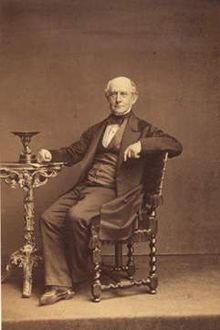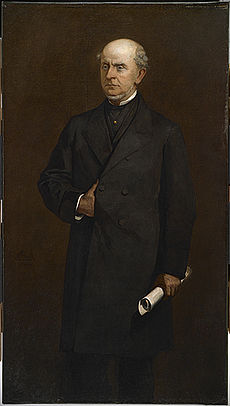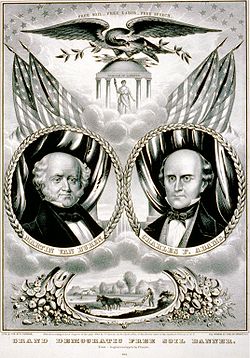- Charles Francis Adams, Sr.
-
For other people named Charles Francis Adams, see Charles Francis Adams.
Charles Francis Adams 
Member of the U.S. House of Representatives
from Massachusetts's 3rd districtIn office
March 4, 1859 – May 1, 1861Preceded by William S. Damrell Succeeded by Benjamin Thomas United States Ambassador to Great Britain In office
1861–1868President Abraham Lincoln
Andrew JohnsonPreceded by George M. Dallas Succeeded by Reverdy Johnson Personal details Born August 18, 1807
Boston, Massachusetts, U.S.Died November 21, 1886 (aged 79)
Boston, Massachusetts, U.S.Political party Whig, Free Soil, Republican Alma mater Harvard University Profession Politician, Lawyer Signature 
Charles Francis Adams, Sr. (August 18, 1807 – November 21, 1886) was an American lawyer, politician, diplomat and writer.[1] He was the grandson of President John Adams and Abigail Adams and the son of President John Quincy Adams and Louisa Adams.
He was born in Boston, and attended Boston Latin School and Harvard College, where he graduated in 1825. He then studied law with Daniel Webster, and practiced in Boston. He wrote numerous reviews of works about American and British history for the North American Review.
Adams was elected to the Massachusetts House of Representatives in 1841, served in the state senate 1844–1845, founded and edited the journal Boston Whig in 1846, and was the unsuccessful nominee of the Free Soil Party for Vice President of the United States in 1848. In 1872, he was again nominated for Vice President, this time by the so-called "Straight-Out Democrats," who were Democrats alienated by the Presidential candidacy of Horace Greeley.[2]
Beginning in the 1840s, Charles Francis Adams, Sr. became one of the finest historical editors of his era. He developed this expertise in part because of the example of his father, who in 1829 had turned from politics (after his defeated bid for a second presidential term in 1828) to history and biography. The senior Adams began a life of his father, John Adams, but only wrote a few chapters before he resumed his political career in 1830 with his election to the U.S. House of Representatives. The younger Adams, fresh from his edition of the letters of his grandmother, Abigail Adams, took up the project that his father had left uncompleted, and between 1850 and 1856 turned out not just the two volumes of the biography but eight further volumes presenting editions of John Adams's Diary and Autobiography, his major political writings, and a selection of letters and speeches. This edition, titled The Works of John Adams, Esq., Second President of the United States, was the only edition of John Adams's writings until the family donated the cache of Adams papers to the Massachusetts Historical Society in 1954 and authorized the creation of the Adams Papers project; the modern project had published accurate scholarly editions of John Adams's diary and autobiography, several volumes of Adams family correspondence, two volumes on the portraits of John and Abigail Adams and John Quincy and Louisa Catherine Adams, and the early years of the diary of Charles Francis Adams. Charles Francis Adams published a revised edition of the biography in 1871. He was elected a Fellow of the American Academy of Arts and Sciences in 1857.[3]
As a Republican, Adams was elected to the United States House of Representatives in 1858, where he chaired the Committee on Manufactures. He resigned to become Lincoln's minister (ambassador) to the Court of St. James (Britain) from 1861 to 1868. Powerful Massachusetts Senator Charles Sumner had wanted the position, and became alienated from Adams. Britain had already recognized Confederate belligerency, but Adams was instrumental in maintaining British neutrality and preventing British diplomatic recognition of the Confederacy during the American Civil War. Part of those duties included correspondence with British civilians including Karl Marx and the International Workingmen's Association.[4] Adams and his son, Henry Adams, who acted as his private secretary, also were kept busy monitoring Confederate diplomatic intrigues and the construction of rebel commerce raiders by British shipyards ( like the hull N°290 , launched as "Enrica" by John Laird & Sons , and which was soon transformed near the Azores Islands into sloop-of-war CSS Alabama ) .
 Mr. and Mrs. Adams on the porch at Peacefield in Quincy
Mr. and Mrs. Adams on the porch at Peacefield in Quincy
 Adams lived on Mount Vernon Street, Beacon Hill, Boston, 1842-1886[5]
Adams lived on Mount Vernon Street, Beacon Hill, Boston, 1842-1886[5]
 Portrait of Adams in 1867 by William Morris Hunt
Portrait of Adams in 1867 by William Morris Hunt
Back in Boston, Adams declined the presidency of Harvard University, but became one of its overseers in 1869. In 1870 Charles Francis Adams built the first presidential library in the United States, to honor his father John Quincy Adams. The Stone Library includes over 14,000 books written in twelve languages. The library is located on the property of the "Old House" (also known as "Peacefield") at Adams National Historical Park in Quincy, Massachusetts.
During the 1876 electoral college controversy, Adams sided with Democrat Samuel J. Tilden over Republican Rutherford B. Hayes for the presidency.
Charles Francis Adams died in Boston on November 21, 1886, and was interred in Mount Wollaston Cemetery, Quincy.[6]
His children[7] with Abigail Brown Brooks included:
- Louisa Catherine Adams (1831–1870) married Charles Kuhn
- John Quincy Adams II (September 22, 1833 – August 14, 1894)
- Charles Francis Adams Jr. (May 27, 1835 - May 20, 1915)
- Henry Brooks Adams (February 16, 1838 - March 27, 1918)
- Arthur Adams (1841–1846)
- Mary Gardiner Adams (1845–1928) married Dr. Henry Parker Quincy
- Peter Chardon Brooks Adams (June 24, 1848 - February 13, 1927)
References
- ^ Chambers Biographical Dictionary, ISBN 0-550-18022-2, page 6
- ^ David Leip's Atlas of U.S. Presidential Elections. 1872 Presidential General Election Results (2005).
- ^ "Book of Members, 1780-2010: Chapter A". American Academy of Arts and Sciences. http://www.amacad.org/publications/BookofMembers/ChapterA.pdf. Retrieved 1 April 2011.
- ^ [1]
- ^ State Street Trust Company. Forty of Boston's historic houses. 1912.
- ^ "Charles Francis Adams. The Aged Statement Gone To His Rest. Passing Quietly Away Surrounded By His Family.". New York Times. November 21, 1886. http://query.nytimes.com/gst/abstract.html?res=9504E7D6123FE533A25751C2A9679D94679FD7CF&. Retrieved 2008-06-17. "Charles Francis Adams died at 1:57 o'clock this morning, at his residence, No. 57 Mount Vernon-street, in this city. He had not been well for some time and had suffered more or less for the past five years from some brain trouble, the result of overwork."
- ^ Adams, Henry, Levenson, J. C., Massachusetts Historical Society, et al. The Letters of Henry Adams, Volumes 4 – 6, 1892–1918. Cambridge: Harvard University Press, 1989, pp. xxxvi.
Further reading
- Butterfield, L. H. et al., eds., The Adams Papers (1961- ). Multivolume letterpress edition of all letters to and from major members of the Adams family, plus their diaries; still incomplete.[2]
- Duberman, Martin. Charles Francis Adams, 1807-1886 Stanford UP 1968
- Donald, Aida Dipace and David Herbert, eds. Diary of Charles Francis Adams. Harvard University Press
External links
- Charles Francis Adams, Sr. at the Biographical Directory of the United States Congress Retrieved on 2009-03-31
- Appleton's Biography edited by Stanley L. Klos
- "Charles Francis Adams, Sr.". Find a Grave. http://www.findagrave.com/cgi-bin/fg.cgi?page=gr&GRid=2842. Retrieved 2009-03-31.
- Nagel, Paul. Descent from Glory: Four Generations of the John Adams Family. Cambridge: Harvard University Press, 1999.
- Texas and the Massachusetts Resolutions, by Charles Francis Adams, published 1844, hosted by the Portal to Texas History
Party political offices Preceded by
(none)Free Soil Party vice presidential candidate
1848 (lost)Succeeded by
George Washington JulianPreceded by
(none)Bourbon Democrat vice presidential candidate
1872 (lost)Succeeded by
(none)United States House of Representatives Preceded by
William S. DamrellMember of the U.S. House of Representatives
from Massachusetts's 3rd congressional district
March 4, 1859 – May 1, 1861Succeeded by
Benjamin ThomasDiplomatic posts Preceded by
George M. DallasU.S. Minister to Great Britain
1861 – 1868Succeeded by
Reverdy Johnson United States Ambassadors to the United Kingdom
United States Ambassadors to the United Kingdom 
Ministers Plenipotentiary to
the Court of St. James's
1785–1811John Adams 1785–1788 · Thomas Pinckney 1792–1796 · Rufus King 1796–1803 · James Monroe 1803–1807 · William Pinkney 1808–1811 · Jonathan Russell (chargé d'affaires) 1811–1812
Envoys Extraordinary and
Ministers Plenipotentiary to
the Court of St. James's
1815–1893John Quincy Adams 1815–1817 · Richard Rush 1818–1825 · Rufus King 1825–1826 · Albert Gallatin 1826–1827 · James Barbour 1828–1829 · Louis McLane 1829–1831 · Martin Van Buren 1831–1832 · Aaron Vail (chargé d'affaires) 1832–1836 · Andrew Stevenson 1836–1841 · Edward Everett 1841–1845 · Louis McLane 1845–1846 · George Bancroft 1846–1849 · Abbott Lawrence 1849–1852 · Joseph R. Ingersoll 1852–1853 · James Buchanan 1853–1856 · George M. Dallas 1856–1861 · Charles Adams, Sr. 1861–1868 · Reverdy Johnson 1868–1869 · John Lothrop Motley 1869–1870 · Robert C. Schenck 1871–1876 · Edwards Pierrepont 1876–1877 · John Welsh 1877–1879 · James Russell Lowell 1880–1885 · Edward J. Phelps 1885–1889 · Robert Todd Lincoln 1889–1893
Ambassadors Extraordinary
and Plenipotentiary to
the Court of St. James's
1893–presentThomas F. Bayard, Sr. 1893–1897 · John Hay 1897–1898 · Joseph Choate 1899–1905 · Whitelaw Reid 1905–1912 · Walter Page 1913-1918 · John W. Davis 1918–1921 · George Harvey 1921–1923 · Frank B. Kellogg 1924–1925 · Alanson B. Houghton 1925–1929 · Charles G. Dawes 1929–1931 · Andrew W. Mellon 1932–1933 · Robert Bingham 1933–1937 · Joseph P. Kennedy 1938–1940 · John G. Winant 1941–1946 · W. Averell Harriman 1946 · Lewis W. Douglas 1947–1950 · Walter S. Gifford 1950–1953 · Winthrop W. Aldrich 1953–1957 · John Hay Whitney 1957–1961 · David K. E. Bruce 1961–1969 · Walter H. Annenberg 1969–1974 · Elliot L. Richardson 1975–1976 · Anne Armstrong 1976–1977 · Kingman Brewster, Jr. 1977–1981 · John J. Louis, Jr. 1981–1983 · Charles H. Price II 1983–1989 · Henry E. Catto, Jr. 1989–1991 · Raymond G. H. Seitz 1991–1994 · William J. Crowe 1994–1997 · Philip Lader 1997–2001 · William Stamps Farish III 2001–2004 · Robert H. Tuttle 2005–2009 · Louis Susman 2009–
Categories:- 1807 births
- 1886 deaths
- Massachusetts Whigs
- Adams family
- American people of English descent
- Children of Presidents of the United States
- Harvard University alumni
- Massachusetts Republicans
- Massachusetts State Senators
- Massachusetts lawyers
- Members of the Massachusetts House of Representatives
- Members of the United States House of Representatives from Massachusetts
- People of Massachusetts in the American Civil War
- People from Boston, Massachusetts
- People from Quincy, Massachusetts
- United States ambassadors to the United Kingdom
- United States vice-presidential candidates, 1848
- United States vice-presidential candidates, 1872
- Massachusetts Free Soilers
- Fellows of the American Academy of Arts and Sciences
Wikimedia Foundation. 2010.

